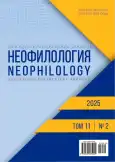Kundyub- basis in Russian dialects: semantics and versions of etymology
- Authors: Kuznetsova E.V.1
-
Affiliations:
- Volgograd State Socio-Pedagogical University
- Issue: Vol 11, No 2 (2025)
- Pages: 259-272
- Section: PARADIGMS OF LANGUAGES AND MODERN LINGUISTICS
- URL: https://journal-vniispk.ru/2587-6953/article/view/297431
- DOI: https://doi.org/10.20310/2587-6953-2025-11-2-259-272
- ID: 297431
Cite item
Full Text
Abstract
INTRODUCTION. In the Don dialects of Volgograd Oblast, the lexeme kundyubenkiy with the meaning 'ugly (about a person)' is recorded. The internal form of the word is obscured for a modern native speaker, which determines the purpose of this study: to trace the formation and development of the semantics of the base kundyub- (for convenience we denoted by the base kundyuball its phonetic variants: kundyub-, kundub-, kundum-, kundum-) in Russian dialects and in the literary language, to reveal the etymology of words of this base.
MATERIALS AND METHODS. The analysis of lexicographic sources of different directions (dialect dictionaries, dictionaries of modern Turkic and Mongolian languages, etymological dictionaries) allowed us to identify dialectal and all-Russian lexemes with the kundyub- base, which differ significantly in semantics and presumably go back to one or two related ancient bases.
RESULTS AND DISCUSSION. The variation of the semantics of lexemes with the kundyub- base in Russian (mainly in the southern dialects) is considered, the links of the analyzed units in Turkic and Mongolian modern languages are established, the question of the composition of lexemes within the ancient base is raised, taking into account the structure and semantics of the units.
CONCLUSION. The versions of the etymology of the words of the kundyub- base with reference to lexicographic sources are given, variants of the formation and development of the semantics of the basis in diachrony are proposed, problematic and controversial points of the issue under consideration are outlined and further prospects of the study are outlined.
About the authors
E. V. Kuznetsova
Volgograd State Socio-Pedagogical University
Author for correspondence.
Email: kev7-78@mail.ru
ORCID iD: 0000-0002-7669-4147
Cand. Sci. (Philology), Associate Professor, Associate Professor of Russian Language and Teaching Methodology Department
Russian Federation, 27 Lenin Ave., Volgograd, 40005, Russian FederationReferences
- Kuznetsova E.V., Tishina E.V. Adjectives with meaning ‘ugly’ in dialects of volgograd region. Vestnik Donets-kogo natsional’nogo universiteta. Seriya D: Filologiya i psikhologiya = Bulletin of Donetsk National University. Series D: Philology and Psychology, 2024, no. 1, pp. 73-80. (In Russ.) https://doi.org/10.5281/zenodo.10987985 , https://elibrary.ru/odojmx
- Remchukov V.N. Explanatory Cossack Dictionary. Volgograd, Stanitsa-2 Publ., 2011, 207 p. (In Russ.) https://elibrary.ru/qwoaij
- Flyagina M.V. The external appearance of a person in the don dialect picture of the world. Nauchnaya mysl’ Kavkaza = Scientific Thought of the Caucasus, 2023, no. 3 (115), pp. 98-103. (In Russ.) https://doi.org/10.18522/2072-0181-2023-115-98-103 , https://elibrary.ru/jzrnzs
- Flyagina M.V. Adjectives of the thematic group “Nature” in Don dialects. Lexical Atlas of Russian Folk Dialects (Materials and Research) 2016. St. Petersburg, LLC «Nestor-Istoriya» Publ., 2016, pp. 461-469. (In Russ.) https://elibrary.ru/xxeqkn
- Stepanchenko V.I. Speak, Chatter, Babble and Apply!: in 2 pt. St. Petersburg, Media Group Publ., 2009, pt. 1, 171 p. (In Russ.) https://elibrary.ru/qvbfxd
- Tkachenko P.I. Kuban Accent: Balachka: Experience of Author’s Dictionary. Krasnodar, Traditsiya Publ., 2011, 397 p. (In Russ.) https://elibrary.ru/qwepox
- Kudryashov R.I. (comp.) Dictionary of Don Dialects of the Volgograd Region: about 17000 Words. Volgograd, Izdatel’ Publ., 2011, 703 p. (In Russ.) https://elibrary.ru/qwpxdz
- Romanov D.A., Krasovskaya N.A. Materials for the Dictionary of Tula Dialects: Based on the Results of Di-alectological Expeditions in 2008. Tula, Tul’skii poligrafist Publ., 2008, 380 p. (In Russ.) https://elibrary.ru/qyqetf
- Pokhlebkin V.V. Culinary Dictionary. Moscow, Tsentrpoligraf Publ., 2009, 502 p. (In Russ.) https://elibrary.ru/qnhznp
- Zabelin I.E. Domestic Life of the Russian People in the 16th and 17th Centuries: in 2 vols. Vol. 2. Domestic Life of Russian Tsars in 16th and 17th Centuries. Moscow, Languages of Russian Culture Publ., 2001, 792 p. (In Russ.) https://elibrary.ru/raziyz
- Fedorov A.I. (ed.) Dictionary of Russian Dialects of Siberia: in 5 vol. Novosibirsk, Novosibirsk branch of the “Nauka” Publ., 2002, vol. 3, 488 p. (In Russ.) https://elibrary.ru/vumcfp
- Kuznetsova E.V. Semantic variation in the word-building nest: linguo-geographical aspect. Neofilologiya = Neophilology, 2020, vol. 6, no. 22, pp. 250-261. https://doi.org/10.20310/2587-6953-2020-6-22-250-261, (In Russ.) https://elibrary.ru/jnuiij
- Sleptsov P.A. (ed.) Yakut-Russian Dictionary: 25300 Words. Moscow, Soviet encyclopedia Publ., 1972, 605 p. (In Russ.) https://www.elibrary.ru/yhntab
- Muniev B.D. (ed.) Kalmyk-Russian Dictionary. Moscow, Kalmyk Institute of Humanities Research of the Rus-sian Academy of Sciences Publ., 1977, 768 p. (In Russ.) https://elibrary.ru/siscfn
- Suprun V.I., Brysina E.V. Language situation in the Volgograd region. Izvestiya Volgogradskogo gosudarstven-nogo pedagogicheskogo universiteta = Proceedings of the Volgograd State Pedagogical University, 2015, no. 3 (98), pp. 154-160. (In Russ.) https://elibrary.ru/tsceor
- Ancient Turkic Dictionary. Leningrad: Saint-Petersburg publishing and book-trading firm “Nauka”, 1969, 676 p. (In Russ.) https://elibrary.ru/sfhrmz
- Orlovskaya M.N., Sanzheev G.D., Shevernina Z.V. Etymological Dictionary of Mongol Languages: in 3 Vols. Moscow, Institute of Oriental Studies of the Russian Academy of Sciences Publ., 2016, vol. 2, 232 p. (In Russ.) https://elibrary.ru/wncgpv
- Gogolev A.I. Indo-European origins in the formation of the ancient Turkic culture. Vestnik Severo-Vostochnogo federal’nogo universiteta im. M.K. Ammosova = Bulletin of the North-Eastern Federal University named after M.K. Ammosov, 2015, vol. 12, no. 1, pp. 64-74. (In Russ.) https://elibrary.ru/tmksjl
- Kochergina V.A. Sanskrit-Russian Dictionary: about 30000 Words with an Appendix of “Grammatical Sketch of Sanskrit” by A.A. Zaliznyak. Moscow: Akademicheskii proekt Publ., 2005, 943 p. (In Russ.)
Supplementary files









